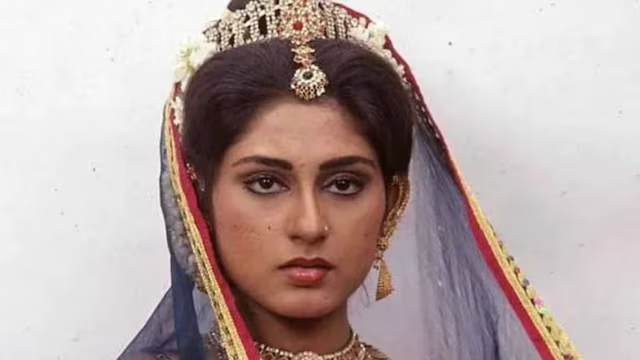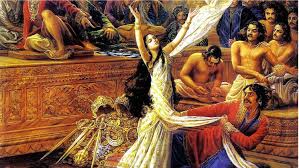Draupadi is one of the most compelling and influential female characters in the Mahabharata. Her life was filled with trials, betrayals, and moments of immense strength, making her a timeless symbol of resilience and dignity. Unlike conventional princesses, Draupadi was not born of a mother but emerged from a sacred fire, her destiny intertwined with the greatest war in history. Her story is one of transformation—from a princess to a queen, from a humiliated woman to a warrior in spirit, and from suffering to justice.
In this blog, we will explore Draupadi’s origins, her marriage, the infamous game of dice, her role in the Kurukshetra war, and her legacy. Through her story, we can reflect on themes of honor, justice, and empowerment that remain relevant even today.
The Divine Birth of Draupadi
Draupadi was not born in an ordinary way. She emerged from the sacred fire of a yajna (sacrificial ritual) performed by King Drupada of Panchala. Drupada had been humiliated by Dronacharya, the great guru of the Kuru princes, and sought revenge. As a result, the yajna produced two divine beings—Dhrishtadyumna, who was destined to kill Dronacharya, and Draupadi, who was fated to play a crucial role in the Mahabharata.

Draupadi’s fiery birth was symbolic of her spirit—unbreakable, passionate, and determined. She was not a passive princess but an instrument of divine will, meant to shape the future of Bharata.
Her name, Draupadi, signified her identity as Drupada’s daughter, but she was also known as Krishnaa due to her dark complexion. From an early age, she was strong-willed, intelligent, and aware of her unique destiny.
The Swayamvara and Marriage to Five Husbands
King Drupada organized a grand swayamvara (self-choice ceremony) for Draupadi. The challenge was almost impossible: any suitor had to string a giant bow and pierce a revolving fish’s eye while looking at its reflection in water.
Arjuna, disguised as a Brahmin, succeeded in the challenge and won Draupadi. However, when he brought her home, Kunti, his mother, unknowingly instructed him to share whatever he had won with his brothers. This led to the unprecedented marriage of Draupadi to all five Pandava brothers.

The concept of polyandry was rare in Hindu epics, but Draupadi accepted her fate with grace and wisdom. She played a crucial role in maintaining harmony among her husbands, setting rules to balance her responsibilities, and ensuring fairness in their relationships. Her marriage, although unusual, highlighted her adaptability and strength in navigating complex situations.
The Game of Dice and Draupadi
The turning point in Draupadi’s life came when Yudhishthira, her eldest husband, was tricked into a deceitful game of dice by Shakuni, Duryodhana’s uncle. One by one, he lost everything—his wealth, his kingdom, his brothers, and finally, Draupadi herself.
In one of the most disgraceful moments in history, Duryodhana ordered Draupadi to be dragged into the Kuru court. As she stood there, humiliated and vulnerable, she questioned the legitimacy of the bet. “If my husband had already lost himself, how could he wager me?” Her sharp intellect exposed the court’s injustice, but her pleas were ignored.
Dushasana, Duryodhana’s brother, attempted to disrobe her in front of the assembly. Draupadi, in sheer agony, called upon Krishna, who miraculously protected her dignity by providing an endless stream of cloth. This divine intervention not only saved her honor but also marked the moment when she vowed revenge against the Kauravas. Her humiliation ignited the flames of the Kurukshetra war.

This incident carries deep symbolism—it represents the consequences of unchecked greed, the mistreatment of women, and the failure of dharma (righteousness) in a corrupt society.
Draupadi’s Role in the Kurukshetra War
Despite her suffering, Draupadi did not break. She stood by the Pandavas during their 13 years of exile, enduring hardships with them. She constantly reminded them of their duty to reclaim justice.
During the war, Draupadi witnessed personal victories and heartbreaking losses. Her brother Dhrishtadyumna fulfilled his destiny by killing Dronacharya. However, tragedy struck when Ashwatthama, seeking revenge, massacred Draupadi’s five sons in the dead of night.
Her grief was immeasurable, but even in her sorrow, she displayed immense strength. She demanded justice but stopped Bhima from killing Ashwatthama outright, proving that even in vengeance, she upheld principles of righteousness. Her confrontation with the Pandavas after the war questioned the cost of revenge and the burden of their choices.
Draupadi: Legacy and Lessons for Today
Draupadi is not just a character of the past; she remains a timeless symbol of resilience, intelligence, and dignity. Her life teaches us:
- The Power of Self-Respect: She never accepted injustice, even when faced with humiliation.
- Courage in Adversity: Instead of being broken by her suffering, she used it to fuel change.
- The Importance of Dharma: She held the Pandavas accountable for their choices, ensuring they followed the path of righteousness.
- Women’s Empowerment: Her story continues to inspire discussions about women’s rights, dignity, and justice in today’s world.
Even today, Draupadi’s name is invoked as an example of a woman who refused to be silenced. Her strength and determination make her a role model for anyone facing injustice.
Draupadi’s journey was filled with trials, but she emerged as one of the most powerful figures in the Mahabharata. From being born of fire to enduring humiliation, from being a devoted wife to a fierce warrior in spirit, she shaped the course of history. Her life reminds us that resilience and justice always have their place, no matter how dark the circumstances.
Her legacy is one of empowerment, dignity, and the unyielding pursuit of truth. In a world still struggling with gender equality and justice, Draupadi’s story remains as relevant today as it was thousands of years ago.
